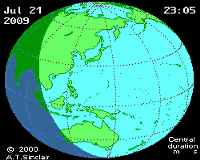 |
Shanghai (AFP) July 16, 2009 The longest total solar eclipse of the 21st century, visible next Wednesday, has sparked tourist fever in eastern China, which according to experts is the best place to view the event. The total eclipse, expected to last about six minutes, will pass from southwest China across the cities of Chengdu and Chongqing to Shanghai and Hangzhou in eastern Zhejiang province, according to NASA's eclipse website. Tourist agencies, park managers and hotels have been overwhelmed by worldwide enthusiasm for the spectacle, which comes as the domestic tourism market is experiencing a slowdown due to the financial crisis and the swine flu. "July is traditionally low season for overseas travellers, but we saw a surprising burst of numbers," said Zhi Chenyan, a deputy manager at the China Travel Service in Zhejiang. "My counterparts in other cities have been disappointed about sales for months..., but all of a sudden we are all having a boom with the eclipse." His team has handled about 600 tourists from United States and Europe since July, an unprecedented number for the travel agency located in Hangzhou. Chen Shiming, spokesman for Shanghai Sculpture Park, one of the most highly recommended viewing locations in the city, told AFP that the park sold more than 2,000 tickets for the July 22 eclipse. "We received lots of calls from Japan, United States and European countries," Chen said. The park is offering a pair of special glasses to view the eclipse and a T-shirt with an eclipse logo for each person purchasing a 150 yuan (22 dollar) ticket, he said. Rooms in the Yangtze river delta region have been fully booked after hotels offered various packages to attract tourists. Shanghai Pudong Shangri-La Hotel is offering a 3,600 yuan package that includes a trip to the Yangshan Deepwater Port, also one of the city's best viewing spots. "We have 200 rooms booked for watching the solar eclipse," hotel employee Gu Wen said. A solar eclipse occurs when the moon is caught between the sun and the earth while each of them moves along their fixed orbits. The last total solar eclipse visible in China took place on August last year. It was observed in remote northwest China. The next total solar eclipse will be on July 11, 2010 but far fewer people are likely to see it as it tracks across the South Pacific over French Polynesia and Easter Island to the southern tip of South America. Share This Article With Planet Earth
Related Links Solar and Lunar Eclipses at Skynightly
 China Best Place To Observe Longest Solar Eclipse In 2000 Years
China Best Place To Observe Longest Solar Eclipse In 2000 YearsBeijing (XNA) May 20, 2009 China is the best place in the world to observe the longest total solar eclipse in 2,000 years that will fall on July 22 and last for more than two hours, Chinese scientists said here Tuesday. The eclipse would begin at about 8 a.m. on July, 22 (Beijing Time), and the length of the total eclipse of the sun will run for up to six minutes, said Li Ding, director of the Bureau of Basic Scienc ... read more |
|
| The content herein, unless otherwise known to be public domain, are Copyright 1995-2009 - SpaceDaily. AFP and UPI Wire Stories are copyright Agence France-Presse and United Press International. ESA Portal Reports are copyright European Space Agency. All NASA sourced material is public domain. Additional copyrights may apply in whole or part to other bona fide parties. Advertising does not imply endorsement,agreement or approval of any opinions, statements or information provided by SpaceDaily on any Web page published or hosted by SpaceDaily. Privacy Statement |